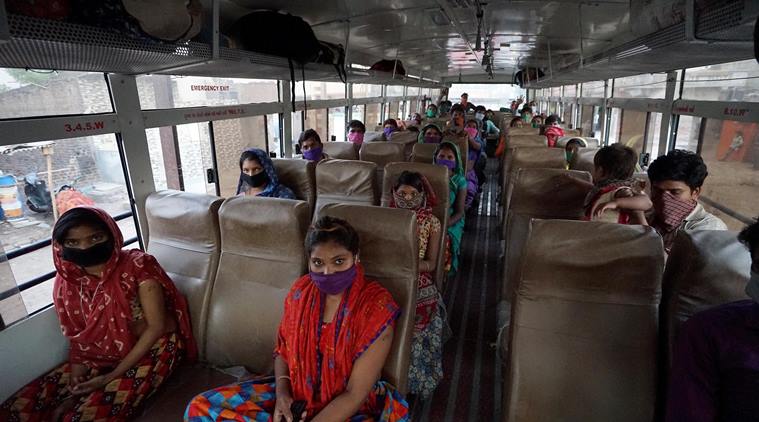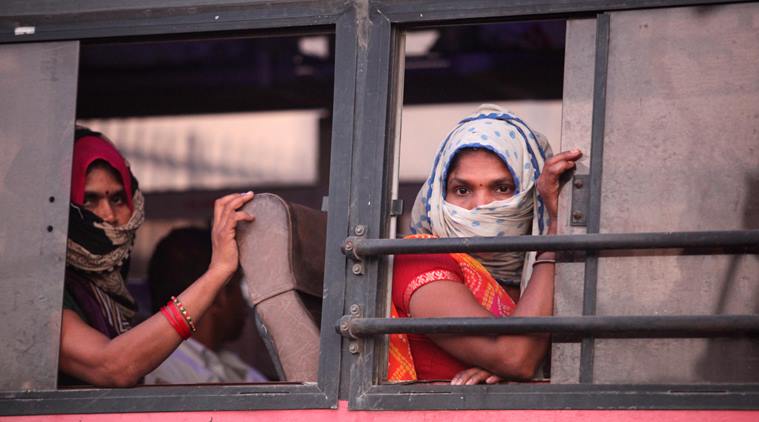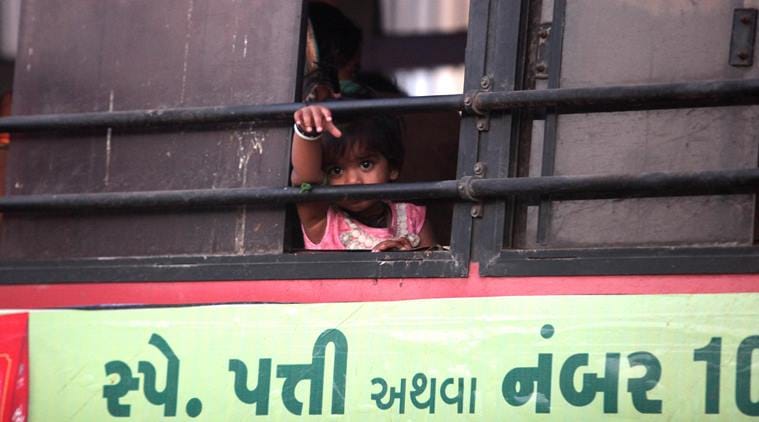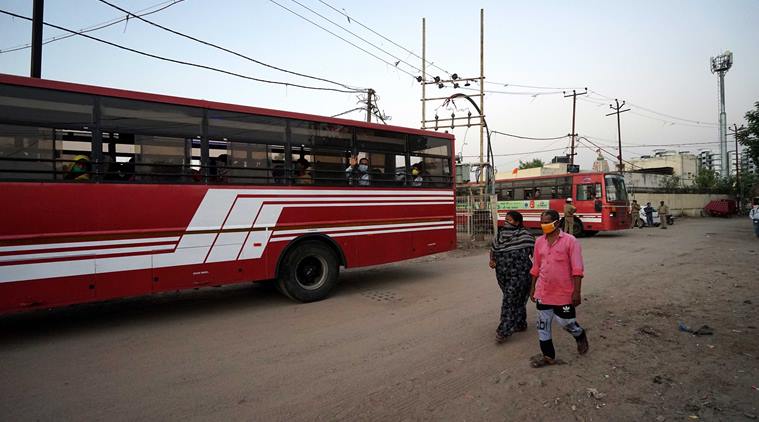 Meanwhile, in Surat, a large number of migrant workers hailing from UP and Odisha, gathered outside Surat Navsari BJP MP C R Patil’s office to get their forms filled to go to their native place. (Express Photo by Bhupendra Rana)
Meanwhile, in Surat, a large number of migrant workers hailing from UP and Odisha, gathered outside Surat Navsari BJP MP C R Patil’s office to get their forms filled to go to their native place. (Express Photo by Bhupendra Rana)
Clutching his army print bag close to him, Anurag Patel (25), a native of Satna in Madhya Pradesh, waited in a queue to board the red GSRTC bus from near the under-construction housing project in Sayajipura –a makeshift transit camp for migrant workers– where he had been living since March 30. There is a box of sweets in the bag, which he will share with his family– a parting gift from the local trust serving meals. In close to a month, this is the first time he is smiling, he says. “I cannot believe the day has finally come when I am heading home. I will see my parents and sister after this long wait. I am so excited to just touch their feet and embrace my sister and ask my mother to make a simple meal of Dal and chawal tomorrow. I will be home in 24 hours, if all goes well,” he says.
Patel, a mechanic with a private company in Ahmedabad, is among the 430 labourers from Madhya Pradesh, who are heading back home from Vadodara on Saturday. For their farewell dinner on Saturday, the labourers were treated to aaloo puris in most shelters, before being segregated to board buses with social distancing in mind. Magi Bhuriya, 40, a woman labourer from Thandla in MP said, “We were feeling homesick. There was enough food and supplies. They took very good care of us after we had walked long distances to reach Vadodara from Surat in March. But we want to go home to meet our families at such a time. I want to see my children who are in the village.”
 Migrant workers heading home after a month long wait. (Express Photo by Bhupendra Rana)
Migrant workers heading home after a month long wait. (Express Photo by Bhupendra Rana)
The labourers are not worried about finding work at the moment. Varsha Bhuriya, 35, also from Thandla, says, “Work will keep coming once the country starts again. Right now everything is closed and we have been locked here for a month. First, we want to go home and we will worry about work later. How can we work without seeing our families. Money is not everything for us. We will come back once things have settled.”
The Gujarat government will drop off the group, segregated in 16 buses from the city and district shelters, at the Ferkuva check post of the Gujarat MP border, from where the Madhya Pradesh government will fetch them in state transport buses and send them home. District Collector Shalini Agarwal said that the decision to send the labourers back was taken in coordination with the administration in Madhya Pradesh.
 Migrant workers heading home after a month long wait. (Express Photo by Bhupendra Rana)
Migrant workers heading home after a month long wait. (Express Photo by Bhupendra Rana)
Chhota Udepur district collector Sujal Mayatra also confirmed that 93 labourers were sent to MP. Mayatra said, “Today, as per approval from higher authorities, the district administration started repatriation of labourers of MP at Ferkuva checkpost. Around 93 labourers will be joining their home district soon. All were bid farewell with masks and hand sanitizers and sweets.”
Additional 220 migrant workers from Dahod and 70 from Panchmahals also headed for Madhya Pradesh on Saturday. VMC Commissioner Nalin Upadhyay told this newspaper that similar arrangement to send back labourers from Rajasthan and Uttar Pradesh, who are still housed in the shelters will begin on Monday after the district administration completes the coordination with the neighbouring state and UP.
Meanwhile, in Surat, a large number of migrant workers hailing from UP and Odisha, gathered outside Surat Navsari BJP MP C R Patil’s office to get their forms filled to go to their native place.
 Migrant workers heading home after a month long wait. (Express Photo by Bhupendra Rana)
Migrant workers heading home after a month long wait. (Express Photo by Bhupendra Rana)
UP Chief Minister Yogi Adityanath had ordered his officials to get the data about the migrant labourers stuck up in different states across the country. Through social media, an awareness had been carried out in Surat city stating that those migrants workers hailing from UP and Odisha, wanted to go back to their native place have to register their names through online at MP CR Patil office.
After receiving such message, a large number of migrant labourers from both the states assembled at MP Patil office, on Saturday afternoon. Strict police arrangements had been laid outside the office of BJP MP so that the labourers assembled should maintain social distance.
Talking to the Indian Express BJP MP C R Patil said, “The data collected by us will be forwarded to district collector office. These labourers are working in different textile factories in Surat city. AT present it is difficult to say about the number of people who had registered themselves. We will continue it for a few more days. We are acting as the bridge between labourers and the district administrative officials.”